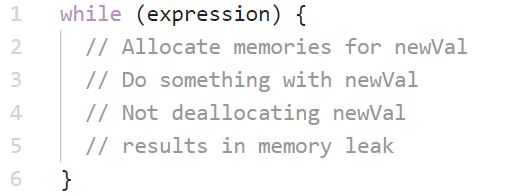未经允许,不可转载。禁止商用。欢迎学术交流讨论和指正。
Commercial use are prohibited, only for academic-purposed discussion and learning.
Memory leak - A program that allocates memory but then loses the ability to access that memory
Why: failure to properly destroy/free dynamically allocated memory.
Analogy: a water pipe have water leaking out and becoming unusable;
- a program's available memory has portions leaking out and becoming unusable.
Consequence: a program occupies more and more memory as program runs
occupying memories -
1. slow program runtime
2. program failure if the memory becomes completely full and unable to allocate additional memory
Demo 9.12.1 Memory leak can use up all available memory
1st iteration
a) Memory is allocated for newVal each loop iteration,
b) the loop does NOT deallocate memory once done using newVal,
c) result in a memory leak
85 _______
86 _______ memory for newVal
87 _______
88 _______
89 _______
90 _______
91 _______
92 _______
2nd, 3rd, 4th, 5th, .... iterations
a) each loop iteration allocates more memory
b) eventually using up all available memory
c) causing the program to fail
85 _______
86 _______ memory for newVal
87 _______ memory for newVal
88 _______ memory for newVal
89 _______ memory for newVal
90 _______ memory for newVal
91 _______ memory for newVal
92 _______ memory for newVal
Common error: failing to free allocated memory when done using that memory -- > a memory leak
Who: programs that are commonly left running for long periods.
Ex. web browsers "
Solution:
Java - garbage collection
1) a program's executable includes automatic behavior that at various intervals finds all unreachable allocated memory locations
- by comparing all reachable memory with all previously-allocated memory
2) automatically freeing such unreachable memory
C/C++ - unstandardized garbage collection
garbage collection
pro: reduce the impact of memory leaks
con: runtime overhead
Debate: new programmers should learn to explicitly free memory vs. letting garbage collection do the work
Exercises 9.12.2: Memory leaks
Question 1: Memory locations that have been dynamically allocated but can no longer be used by a program
Answer 1: Unusable memory
Question 2: Occurs when a program allocates memory but loses the ability to access that memory.
Answer 2: Memory leak
Question 3: Automatic process of finding unreachable allocated memory locations freeing that unreachable memory.
Answer 3: Garbage collection
